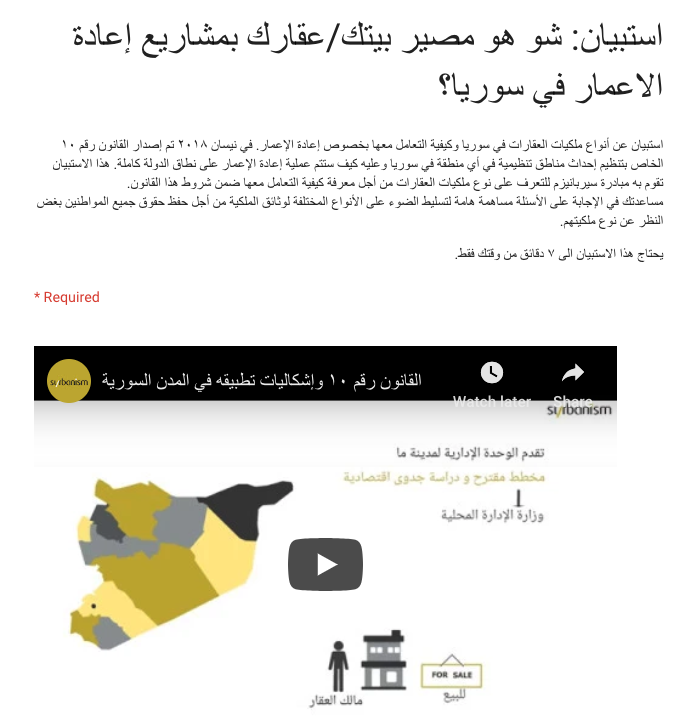SYRBANISM SURVEYS PROPERTY TYPES IN SYRIA TO ASSESS THREAT NEW REGULATION POSES TO DISPLACED OWNERS
Interview with Edwar Hanna
In April 2018 Syria issued Law 10, which sets guidelines for the creation of development zones over existing urban areas. The law stipulates the re-allotment of property, within set timeframes, in preparation for reconstruction. Experts are warning that Law 10 discounts the majority of the residents of areas destroyed during the war, who have been forcibly separated from their homes.
I interviewed Edwar Hanna of Syrbanism about a survey the group has launched which aims to understand the typology of property in Syria and the different ways owners of each type will be impacted by the new law. Syrbanism is an urban initiative founded in 2017 by Hanna and fellow Syrian architect Nour Harastani, „to support oppressed Syrian residents against urban injustices.”
Syrian residents can take the short survey, which is available online, in Arabic, here.
What is the objective of this survey?
In Syria we have multiple types of property title deeds, from green tapu (tabbo), or title in land registry, to what is referred to as law court ruling, contract at public notary, “contravener” with no document, and others. With Law 10 out, those who have a green tapu are okay. However, the rest – many of whom do not know their ownership type – will now scramble to save their rights. You either have a green tapu or you are in a whole separate category. Our main aim is to plot the wide spectrum of property types. Our aim is not to formalize the informal, but to systematize it.
Collective rights are tied to customs and traditions. For instance, if one has electricity and water bills, they are customarily recognized as documents proving the existence of the property. In theory, they have no value, but there is behind it a whole society that recognizes it. This social pressure made the electricity bill an official document that acknowledges your right. Now the state comes and issues laws that override these norms while residents are displaced. These regulations shook the foundations of the whole social contract to establish ownership and left many people susceptible to the loss of their rights. To protect these rights we must first assess the percentage of those owners. It then becomes possible to propose a system that safeguards residents’ rights and reverse the damage done by the new regulations.
While the social contract to establish ownership is being dismantled, we must remember that property rights are comprised of not only ownership, but also tenure. What we aim to protect is the right to possession. A policy question that will arise from the survey is how to protect the rights of possession for those who have them.
You ask the survey takers whether they are registered in the same civil registry as where they live(d). How is that related to the status of residents’ property?
Law 10 stipulates that development zones are to be created by each district’s local council, which in theory is locally elected. However, these rights are not given to people living in the district, but rather to those in the civil registry of that area. If you look at cases such as the Qudsayya suburb of Damascus, those under this civil registry number only 3500, only half of whom have the right to vote. However, 30 to 40 thousand people lived in Qudsayya. This means that less than five per cent of them can vote and have their interests represented and grievances heard. The last question of the survey aimed at better understanding this discrepancy.
What is your methodology and how does this survey fit into the other research you do at Syrbanism?
This survey is part of a wider study we are conducting that will be published by the Friedrich Ebert Stiftung alongside other Housing, Land and Property (HLP) studies about Libya, Iraq, and Yemen.
Our methodology consists mainly of a desk review of the issue of ownership in Syria, interviews with law and urbanism experts, and additional surveys online and on the ground in different areas in Syrian.
Our research is a continuation of projects we started at Syrbanism, which aimed at raising awareness, as well as questions, about urban life in Syria and the specific ways residents affected by the war are further impacted by changing policy and regulation.
 The Aleppo Project
The Aleppo Project